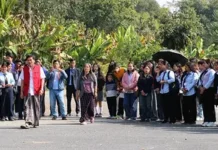ITANAGAR, 17 Feb: “Climate change is one of the greatest threats to Earth’s ecosystems and global security and it presents an existential challenge to us all,” Deputy Chief Minister Chowna Mein said on Thursday.
Addressing environmental and climate change experts, legislators, government officers and students during a seminar on ‘Climate change and sustainable future – the Arunachal perspective’ at the DK auditorium hall of the legislative assembly here, the DCM said, “We need some kind of necessity and urgency in mitigating climate change impacts on our ecosystems and food security.”
He said that slight variation in the climatic condition, coupled with extreme weathers due to climate change, might be a threat to the state’s rich biological and cultural diversity, sustainability of social and economic development and the livelihood environment in the state.
“In Arunachal Pradesh, forests have been the mainstay for the livelihood of the local people dependent on forest resources,” he said, and, quoting the India State of Forest Report, 2021, informed that Arunachal has witnessed a loss of 257 sq kms of forest cover “compared to the 2019 assessment with the total forest coverage of 66,430.67 sq kms (79.33 percent of the total geographical area).”
He said that the impact of climate change is already visible in the state. “The five rivers of Arunachal Pradesh, ie, Siang, Lohit, Tirap, Subansiri and Kameng, have lost their original green emerald colours and have now diminished due to increase in turbidity.”
The DCM also expressed concern over the impact of dumping plastic waste into the rivers on the aquatic lives in the river systems.
He called for imposing “a blanket ban on hunting of wild animals and plucking of edible plants and forest vegetation for commercial purposes.”
On the other hand, Mein urged the experts to come up with a “proposal of alternate source of livelihood for those living in the vicinity of the wildlife areas and the animal corridors,” saying that they depend on the forests for their livelihood. “They need to be given alternate source of livelihood, so that the natural habitations of the wildlife are not disturbed,” he said.
“Though jhum cultivation is the tribal way of life, it needs to be substituted with sustainable agriculture and horticulture, and the government has taken various measures to improve the farming community and to bring in changes in the farming technique with introduction of farm mechanization, terrace cultivation, etc, through credit-linked schemes,” Mein said.
He further said that the state government has resolved to “accelerate comprehensive, smart, climate resilient and inclusive development of the people with all-round efforts by adopting the Pakke Tiger Reserve 2047 Ministerial Declaration on ‘Climate change resilient and responsive Arunachal Pradesh’ adopted at Pakke-Kessang in November 2021.”
Mein further said: “Arunachal is known as the storehouse of hydropower, and we have identified 29 hydro projects to be executed by CPSUs with an estimated capacity of 32,000 mw, some of which have already been given to the NHPC, the NEEPCO, the SJVN, the THDC, etc, and many are in the pipeline.”
He said that the time has come for the tribal people of the state to “adopt our own traditions for coexisting with nature, so that our future generations would also get the same enrichment which our ancestors left for us.”
International expert on climate change adaptation and mountain livelihoods, Dhrupad Choudhury said, “If we have changes in temperature and water scarcity, it is going to affect food production, which means that we are looking at serious consequences for food and nutritional security.”
Speaking on the impacts of climate change in the Hindu Kush Himalaya region, Choudhary said, “We would lose 64 percent of the global ice at the present economy of development, which means that snow-covered areas and snow volumes will decrease and the snowline alleviation will increase.”
The Brahmaputra basin in particular will witness consistent rise in the level of water, he said.
Legislative Assembly Speaker PD Sona, who also attended the seminar, spoke on “the political will and the government’s position to address the challenges.”
“Everybody should make a collective effort to fight climate change, so that the future does not get affected,” he said, adding that “the government should be careful as the state is coming up with large infrastructure developments.
“We need to grow, but with compassion,” Sona said.
Among others, State Information Commissioner Gumjum Haider, Indigenous People’s Climate Justice Forum founder Rituraj Phukan and Chief Conservator of Forests Rajesh S also spoke.
Earlier, Mein, along with Sona inaugurated a photo exhibition titled ‘Revisiting our roots through the lens of Verrier Elwin’, as part of the golden jubilee celebration of Arunachal Pradesh.
Conceptualized by the DCM, the exhibition features photographs captured by renowned anthropologist Dr Verrier Elwin. It will be open to the public from 17-19 February. (With input from DCM’s PR Cell)


